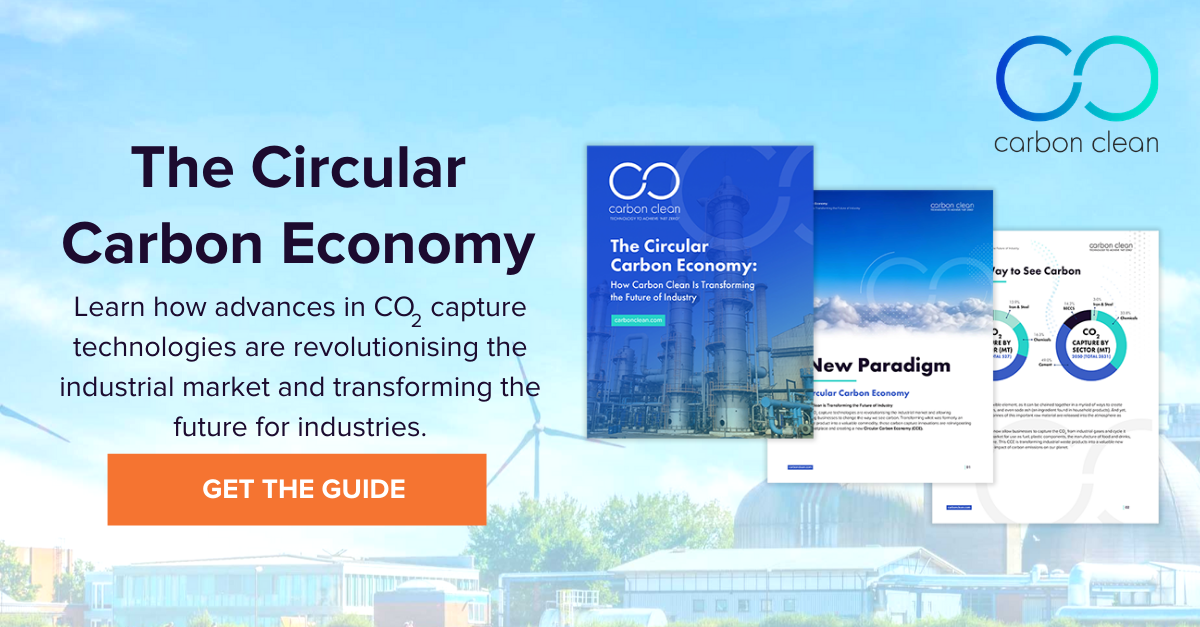Refineries are facing growing pressure to reduce their carbon footprint and impact on our environment. If we're going to achieve net zero by 2050, now is the time for the industry to begin investing in carbon capture, utilisation and storage (CCUS) technology.
Watch the video to hear Glen Bailey, Sales Director for North America at Carbon Clean, explore how carbon capture for refineries can help reduce their carbon footprint and set us on the path to net zero.
What factors make carbon capture difficult in the refining industry?
Refineries have several units that emit CO2, including steam methane reformers that produce hydrogen, catalytic crackers, and Combined Heat and Power (CHP) units. The emissions of an individual refinery depend on a number of factors, such as the configuration of the refinery, type of fuel used, and crudes processed.
For instance, heavy sour crudes require more energy to process than light sweet crudes. With so many carbon dioxide point sources, as well as limited space on-site and remote locations, carbon capture can be complicated for refineries.
What factors are contributing to pressure to reduce emissions in the refining industry?
Contributing to about 4% of global CO2 emissions and with net zero initiatives becoming more widely adopted, the refining sector faces increasing pressure to lower carbon emissions. This will only increase over the coming decades. Carbon Capture, Utilisation and Storage (CCUS) technology provides one of the best ways refineries can decarbonise, and carbon capture can be paired with hydrogen production to provide new opportunities and diversify value chains.
Increased public awareness and involvement of younger generations are adding further pressure for decarbonising the industry. Also, financial incentives such as carbon taxes or credits are motivating the industry to find ways to optimise, recycle or reduce their CO2 emissions even more.
The oil and gas industry has seen tremendous innovation over many decades and is now responding to society's expectations with environmental and sustainability planning. Major players in the oil and gas industry have made pledges towards net zero in the next 30 years and are pushing for the adoption of carbon capture, utilisation and storage at a rapid pace.
Is the refining industry in a good place to start using Carbon Clean’s technology?
Absolutely. With the challenges that refineries can face in implementing carbon capture, space-saving and cost-saving modular solutions are crucial. Using Carbon Clean’s technology, refineries can capture 90%+ of their carbon dioxide emissions.
Our modular carbon capture system can be deployed to capture CO2 at multiple point sources with a smaller footprint, all while lowering the required capital investment. Refinery operations emit a variety of CO2-containing gas streams. But, with Carbon Clean’s process design, solvent stability, and experience with these feedstocks, we can help refineries successfully capture and refine CO2.
By integrating CCUS with other practices such as energy efficiency, low-carbon oil, and tapping into renewable power generation, refineries can move towards net zero in a safe and practical way. These measures can also become a key competitive differentiator for refineries as their customers have greater incentives to use low-carbon fuel.
How can refineries participate in the circular carbon economy?
Innovative new processes now allow businesses to capture the CO2 from industrial-process and off-gases and cycle it back into the production market for use as fuel, plastic components, the manufacture of food and drinks, building materials, and more. This circular carbon economy is transforming industrial waste products into a valuable new resource and reducing the impact of carbon emissions. The associated infrastructure is developing rapidly, and the refining industry can play a big role in these markets.
Are you ready to reduce your carbon footprint and take part in the circular carbon economy by investing in carbon capture for refineries? Download your whitepaper 'The Circular Carbon Economy: How Carbon Clean Is Transforming the Future of Industry' to learn how hard to abate industries can start using CCUS technology to capture and resell their carbon.

